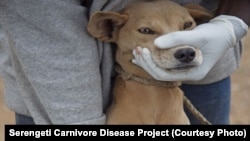BENTIU, SOUTH SUDAN —
South Sudan has been faced with a number of problems since it became the world's newest nation in July 2011.
Oil exports, the backbone of South Sudan's economy, have been halted over a row with Khartoum over pipeline fees.
Refugee camps are full as fighting continues in some border areas.
Politicians have been accused of rampant corruption. Flooding has wiped out harvests in Northern Bahr el Ghazal state, leaving many children vulnerable to malnutrition. Rebels led by former ally, David Yau Yau, have launched deadly cattle raids, killing more than 100 people last month alone.
And now, an oft-overlooked problem is also plaguing the South Sudanese: it's stray dogs, some of which carry the potentially deadly rabies virus.
Last year, at least 20 people in a single county in Unity state died of rabies after being bitten by stray dogs, according the officials at the health ministry.
This week, officials say seven people were treated for dog bites in Bentiu, the capital of Unity state.
"We gave them anti-virals and now they are well, all of them," said Dr. Sabino Andrew Amum of Bentiu state hospital.
Stray dogs are legion on the streets of Bentiu, and the mutts strike fear into many residents.
"These roaming dogs, they are dangerous for human beings... especially kids," said Bentiu resident Peter Gaw Ngundeng.
"They normally attack young boys. My fear is that if they continue increasing in number and roaming around, then they are dangerous for our children.”
Botino Malual Kok, Director General of the state Ministry of Animal Resources and Fisheries, called on the police to kill stray dogs, saying that they pose a danger to both city dwellers and to rural pastoralists.
“These street dogs are the ones who cause rabies and they are very dangerous," he said.
"Sometimes they bite animals and we know the people of Unity state, most of them keep livestock.”
Rabies is most often transmitted through the bite of an infected animal, and one species, such as dogs, can infect another, such as humans.
In dogs, symptoms of rabies infection range from aggressive behavior and frothing at the mouth, to paralysis and lack of coordination.
In humans, early symptoms are similar to those associated with flu, but the illness progresses within days to produce symptoms including "cerebral dysfunction, anxiety, confusion, agitation.... delirium, abnormal behavior, hallucinations, and insomnia," the US Centers for Disease Control and Prevention (CDC) says.
Once clinical signs of rabies appear in humans, the disease is "nearly always fatal," the CDC says.
Oil exports, the backbone of South Sudan's economy, have been halted over a row with Khartoum over pipeline fees.
Refugee camps are full as fighting continues in some border areas.
Politicians have been accused of rampant corruption. Flooding has wiped out harvests in Northern Bahr el Ghazal state, leaving many children vulnerable to malnutrition. Rebels led by former ally, David Yau Yau, have launched deadly cattle raids, killing more than 100 people last month alone.
And now, an oft-overlooked problem is also plaguing the South Sudanese: it's stray dogs, some of which carry the potentially deadly rabies virus.
Last year, at least 20 people in a single county in Unity state died of rabies after being bitten by stray dogs, according the officials at the health ministry.
This week, officials say seven people were treated for dog bites in Bentiu, the capital of Unity state.
"We gave them anti-virals and now they are well, all of them," said Dr. Sabino Andrew Amum of Bentiu state hospital.
Stray dogs are legion on the streets of Bentiu, and the mutts strike fear into many residents.
"These roaming dogs, they are dangerous for human beings... especially kids," said Bentiu resident Peter Gaw Ngundeng.
"They normally attack young boys. My fear is that if they continue increasing in number and roaming around, then they are dangerous for our children.”
Botino Malual Kok, Director General of the state Ministry of Animal Resources and Fisheries, called on the police to kill stray dogs, saying that they pose a danger to both city dwellers and to rural pastoralists.
“These street dogs are the ones who cause rabies and they are very dangerous," he said.
"Sometimes they bite animals and we know the people of Unity state, most of them keep livestock.”
Rabies is most often transmitted through the bite of an infected animal, and one species, such as dogs, can infect another, such as humans.
In dogs, symptoms of rabies infection range from aggressive behavior and frothing at the mouth, to paralysis and lack of coordination.
In humans, early symptoms are similar to those associated with flu, but the illness progresses within days to produce symptoms including "cerebral dysfunction, anxiety, confusion, agitation.... delirium, abnormal behavior, hallucinations, and insomnia," the US Centers for Disease Control and Prevention (CDC) says.
Once clinical signs of rabies appear in humans, the disease is "nearly always fatal," the CDC says.











